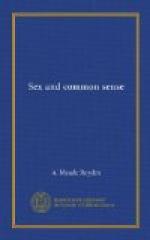But, it will be urged, ill-health is quite another kind of disharmony than vice. We are not responsible for it, and cannot be blamed.
I am not prepared to admit that this is altogether true, but I will not discuss it now. The point I want to make clear, if I make nothing else clear, is that to be born with a certain temperament is not in itself a sin nor does it compel you to be a sinner. “Your temperament decides your trials; it does not decide your destiny.” It is no more “wicked” to have the temperament of a homosexual than to have the weakness of an invalid. It is difficult for the spirit to dominate and to bring into a healthy harmony a body predisposed to illness and disorder. The greater the glory to those who succeed! Let us confess with shame that in this other and far harder case we have not only ignored the difficulty and despised the struggler, but—God forgive us—have, so far as in us lay, made impossible the victory.
VIII
MISUNDERSTANDINGS
“If there is one result or conclusion that we may pick out from the science of sex which has developed so rapidly of recent years, as thoroughly established and permanently accepted, it is that the old notion of the sinfulness of the sex process, in se, is superstitious, not religious; and must be discarded before ethical religion can assert its full sway over humanity’s sex life. And, most assuredly, the conception narratives [of the New Testament], by retaining the sex process to the important extent of normal pregnancy and parturition, foreshadowed and hallowed this development of ethical thought. They make it clear that the Spirit of God and the spirit of woman, in conscious union, refuse to justify superstitious and paralyzing fears, refuse to allow that the sex process is irredeemable; they render possible and imperative the working out of the ethical problems directly concerned with sex.”
Northcute: Christianity and Sex Problems, pp. 415, 416.
During the course of these addresses I have more than once, and with more than common urgency, pleaded for the light of knowledge, that we may in future not make so many disastrous mistakes from sheer ignorance and misunderstanding. I have been asked to say more definitely what “misunderstandings” I had in mind, and to discuss them with at least as much courage as I have so pressingly demanded from others.
The demand is just; and I feel the less able to disregard it because I have discussed these very difficulties with people whose lives have been wrecked by the ignorance in which they were brought up, or saved by knowledge wisely imparted before the difficulties arose. Knowledge cannot save us from hardship or difficulty; it cannot make us invulnerable to attack, or lift us above the ordinary temptations of ordinary mortals; but it can show us where we are going; it can guide us when we wish to be guided; it can save us, when we wish to be saved, from mistakes cruel to ourselves and often far more cruel to other people.




